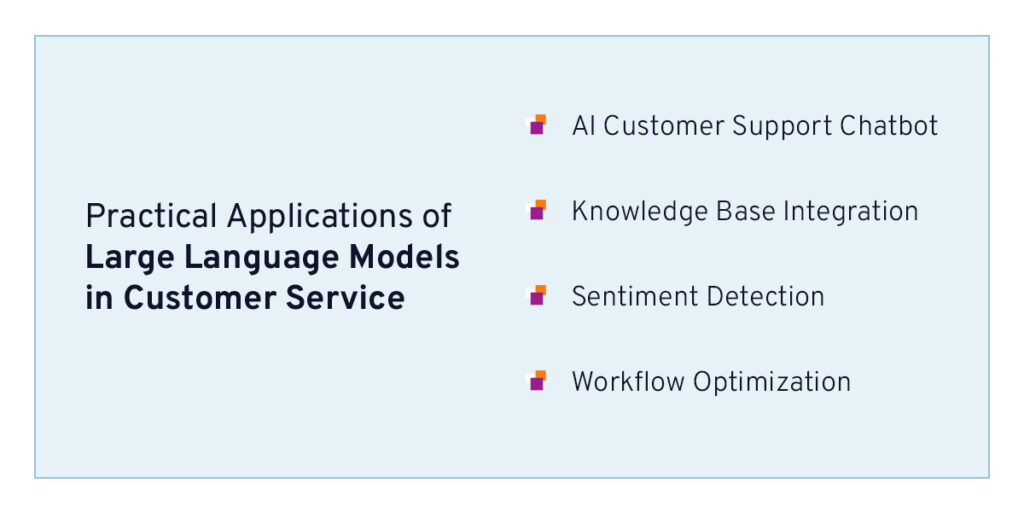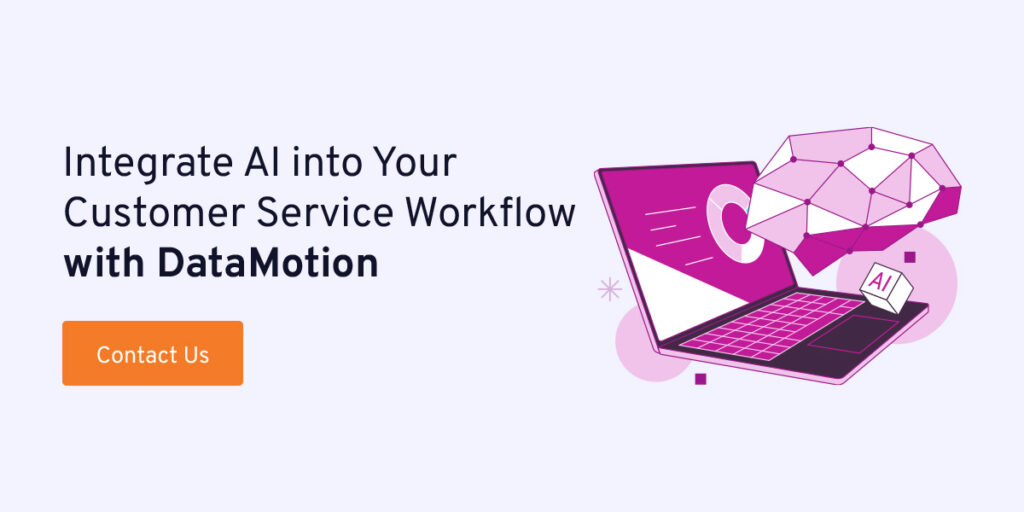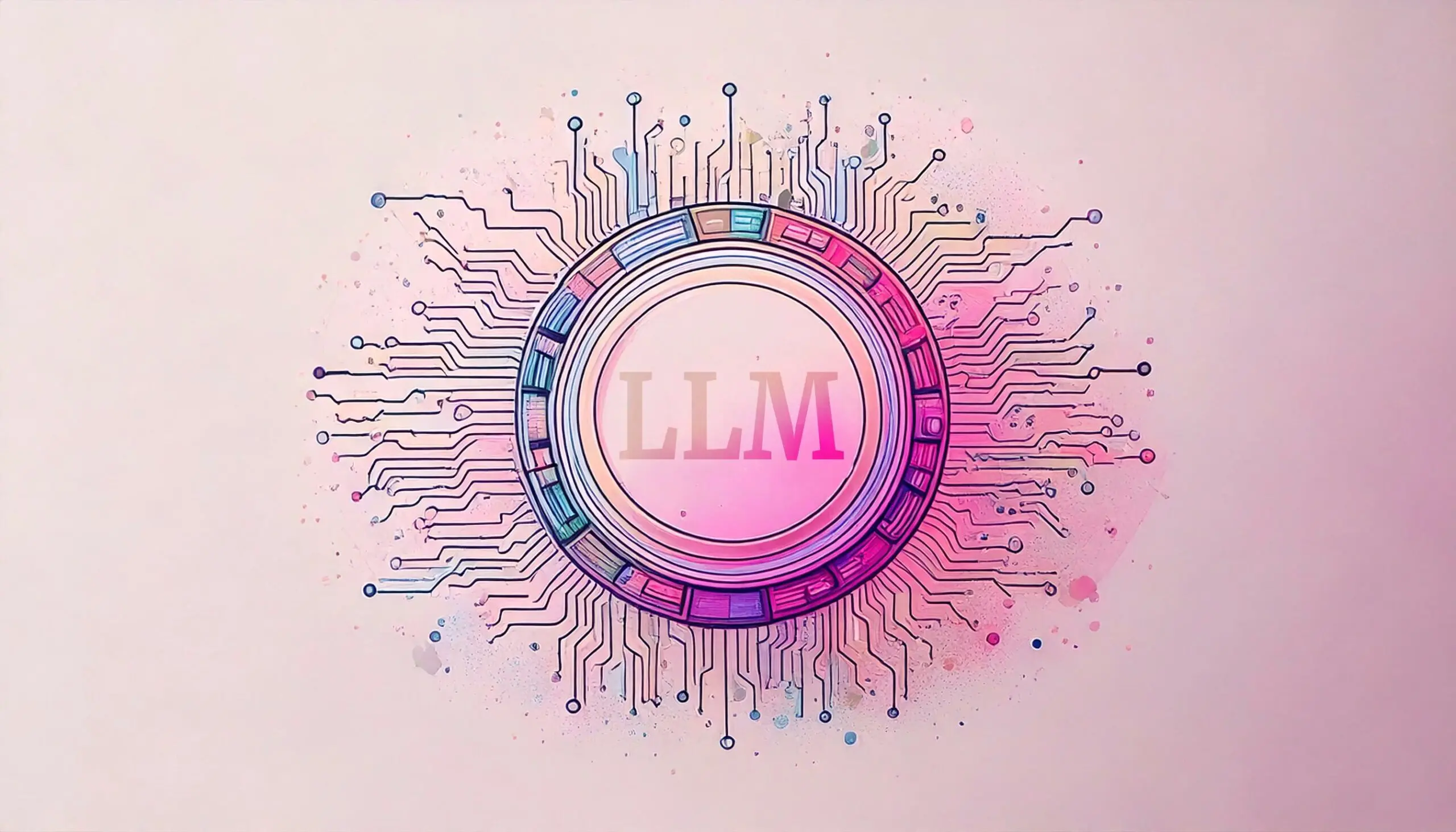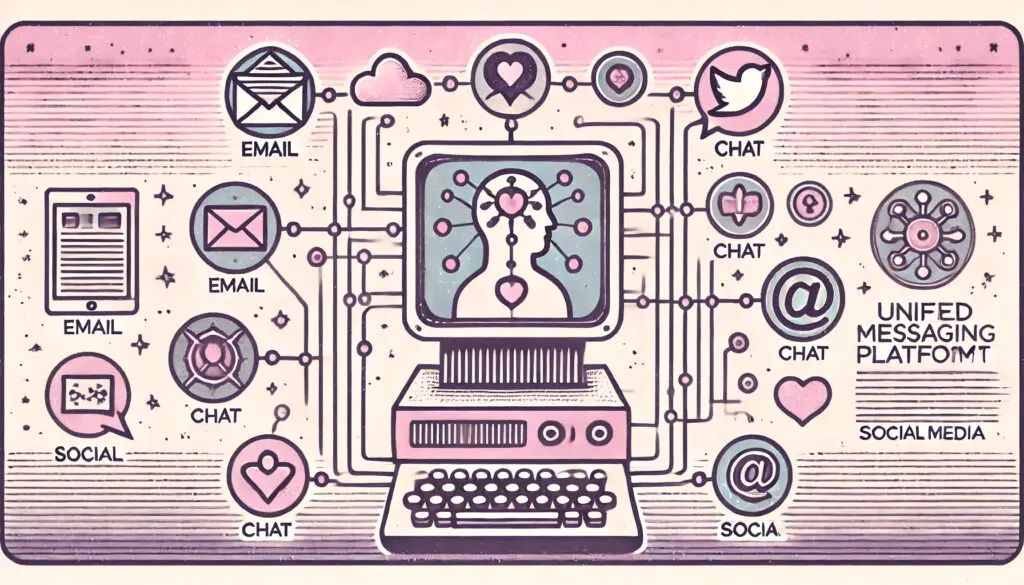AI and Large Language Models (LLMs) are taking the world by storm with their seemingly endless capabilities. It’s true that LLMs can do a lot, especially in customer service settings. As your company strives to keep up with the latest and greatest in technology, you can discover new ways to boost efficiency and better serve your customers. Large language models can be tremendously valuable in customer service chat applications and beyond to enhance the customer experience.
Discover the potential of LLMs for your customer service framework.
Introduction to Large Language Models in Customer Service
A large language model is a type of AI engine that specializes in understanding and processing human language. How exactly does an LLM learn to comprehend language? Extensive training. LLMs learn through a combination of processes, including supervised learning, unsupervised learning, and sometimes reinforcement learning. While models can be trained in different ways, the focus remains on selecting an LLM that best meets specific business needs. One process, called supervised learning, focuses on predicting the next word in a sequence. The LLM is trained on vast amounts of diverse text data, which it uses to learn language patterns, syntax, grammar, facts and reasoning abilities.
This training also involves Natural Language Processing (NLP) algorithms — rule-based modeling of human language — to help the LLM develop communication abilities. Ultimately, this algorithmic training allows the LLM to understand text inputs and provide coherent, contextual responses — a true game-changer in the world of customer service.
Meeting customer needs is a key aspect of any business, but many companies lack the availability and the team scale required to meet these needs around the clock. With the power of generative AI, customer service becomes more accessible for businesses. LLMs can analyze customer inquiries at any time and provide instant, relevant, humanlike responses to guide customers through the buyer’s journey and improve the overall experience.
While using AI in customer support allows you to offer 24/7 availability to your customer base, it can also help to reduce response times, leaving customers more satisfied with your business. As your organization grows, generative AI can scale with you and continue to meet customer queries. Plus, AI models can communicate in different languages to service customers worldwide.
One of the best examples of artificial intelligence in customer service is a chatbot. Chatbots are often built into a site’s interface, giving customers direct access to support as they review products or services. These chatbots can provide information about products, define different types of services or even offer recommendations based on users’ needs.
Open Source LLMs vs. Custom LLMs
The foundation of an LLM’s training is text data, and the information it learns from this data plays a role in how the AI works. An open-source LLM is trained on massive amounts of public data available online. These LLMs are great for providing general information about a wide range of subjects, but they typically lack specialization.
If you wanted to use an open-source LLM for customer support, the lack of control over its training would make it more challenging to address buyers’ questions about your brand and could potentially raise data security or compliance concerns, especially in regulated industries. This is where custom LLMs can be a better approach. These AI models often utilize the same foundational information as open-source models but undergo additional training with proprietary datasets in a process known as fine-tuning, which involves using specific information about your business. This custom approach can align responses to your unique tone, terminology, and compliance requirements, helping to ensure that customer interactions are not only accurate but consistent with your brand and compliant with industry regulations.
Benefits of Customizing Large Language Models for Customer Service
We’ve established that custom, fine-tuned LLMs offer something more than the standard open-source models available online, but how can they benefit your customer service practices?
Meet Your Specific Needs
A customized LLM is trained on datasets that are entirely unique to your business, such as product brochures, service descriptions and case studies. With these materials, a custom, fine-tuned LLM is equipped to answer a wide range of customer questions and handle interactions that are highly contextual to your business.
Beyond the nuances of your products and services, custom LLMs can help your business align with specifications within your industry, including relevant compliance regulations. For example, if your organization handles health care records, you can establish which information can and cannot be shared in a conversation with a customer. These parameters can also be useful for payment information and other sensitive data, like social security numbers.
Deliver Consistent Messaging
Consistent messaging is key to building trust with your customer base, and custom LLMs can deliver the same message every time. Delivering consistent information offers more clarity in customer support and reduces the potential for an upset in the future.
While consistent messaging is valuable for clarity, it also contributes to brand integrity. Using branded phrases and maintaining a narrative in customer service makes it clear what your company represents. Use your custom LLM across channels, and customers gain a sense of your brand, regardless of where they interact with it.
Enhance Customer Experience
Creating positive customer experiences helps you build a strong reputation, and custom LLMs make that possible. With 24/7 availability, your customers have access to support when they need it. Rather than waiting for a customer service agent to respond when they have the time, your custom LLM will provide a timely response to every question, leaving your customers satisfied.
Reduce Costs
A custom LLM supports your existing customer service team without the need to hire more agents. Save on training, benefits and payroll while providing responsive, consistent customer service.
The cost savings that come with a custom LLM are a huge benefit to growing companies. Customer bases can expand rapidly, and a growing business might lack the resources to hire a large customer service team. Custom LLMs can offer a similar level of support at a fraction of the cost.
Practical Applications of Large Language Models in Customer Service
You know you want to meet your unique needs, improve messaging, enhance customer experience and reduce costs. The good news? You have plenty of ways you can do it.

AI Customer Support Chatbot
One of the most familiar use cases of AI in customer success is a chatbot. You’ve likely experienced one yourself while shopping online. These chatbots typically appear as buttons in the bottom corner of your screen. Pop-up chat boxes and a curated list of topics to choose from encourage engagement, or a user can open the chat box on their own to start the interaction.
AI chatbots can be accessible on every page of your site, ensuring customers get their questions answered as soon as they arise. Your chatbot can also include cues based on the information a customer is looking for or the page they are visiting. For example, if a customer asks about one of your products, the chatbot can stir curiosity with follow-up questions like, “Can you tell me more about what features are included with [product]?”
Knowledge Base Integration
Companies often have knowledge base resources for proprietary products. Integrate your AI chatbot with your knowledge base to easily connect your customers to the right information. A customer might send a question about a particular feature, and your chatbot will respond with information pulled from the correct knowledge base resource. You can also train this tool to provide links to the appropriate resources to encourage self-help for your customers.
An AI chatbot trained on your own product knowledge base can help customers find the right product, answer questions about various features and guide shoppers to how-to resources.
Fun Fact: Chatbots can also be trained on the data from your website and the DataMotion JenAI Assist™ public-facing chat feature does just this. Try it out for yourself by clicking the puffin in the lower-right hand corner.
Sentiment Detection
Sentiment detection has become an increasingly popular way to use custom LLMs in customer service. While AI in customer success is typically thought of as a way to communicate with customers, it can also be used to assess customer satisfaction. By training your LLM to understand the emotions behind different phrases and sentence structures, your AI tool can offer insight into a customer’s happiness level and respond accordingly. Note that accurate sentiment detection often requires models trained on specific data that reflect the nuances of customer service interactions.
Let’s look at an example. A customer emails your business feeling dissatisfied with your product. Your LLM picks up on phrases like “disappointed” and “won’t purchase again” that indicate the customer’s unhappiness. The LLM can respond with empathetic language, such as, “I’m sorry” and “Thank you for sharing your thoughts.” You might also train your LLM to offer a discount code or freebie for unhappy customers.
Sentiment data is also valuable for big-picture feedback. Are your customers more satisfied or dissatisfied with your products or services? Month-to-month, how do the percentages of happy to unhappy change? Your LLM can collect this information as it interacts with your customers to help you better understand the customer experience.
Workflow Optimization
Large language models can be used to optimize existing workflows for customer support. You’re likely not going to count on your LLM to handle every customer interaction. Some support cases are nuanced and require a customer service professional to solve the problem. LLMs can filter through each support case to determine if more support is needed. For example, you might use your AI chatbot as the first touch point for customer service needs. Through a series of questions, your LLM can find out how to help the customer. Sometimes, the data store it references will be enough to solve the problem. Your chatbot can ask, “Did that solve your problem?” after each recommended action. If the answer is no after the chatbot exhausts all options, it can connect the customer with a person over chat or offer a phone number to call. Furthermore, with the most sophisticated chatbots customers can choose to escalate to a live person at any time.
This tiered approach to customer service enables AI to provide fast answers for common inquiries and escalate more complex issues to human agents. This balance allows your customer service team to focus their time on high-impact interactions while reducing overall response times and enhancing customer satisfaction. Ultimately, it’s about enhancing the human experience, not replacing it.
Integrating AI into Existing Customer Service Frameworks
With all the benefits and applications for AI in customer service, you might be ready to jump on the opportunity. Before you take the leap, consider these factors:
- Training requirements: Using LLMs can lead to powerful advantages — if you know how to use them. For the best results with these tools, your customer service team needs to understand how they work and when they play a role. Offering regular learning opportunities for your team is key when you integrate these solutions.
- Integration: You have options for your LLM integration experience. You can work with a trusted expert to implement AI solutions with your existing systems, or you can build it internally. If you lack the resources or expertise, working with the right provider can offer excellent customization opportunities without your team building the system.
- Data security: Data security and customer privacy are top concerns when handling sensitive information, especially in industries like healthcare, finance, and the public sector. Whether you use a custom AI chatbot or an email LLM, you need to have strong practices in place to safeguard your data. Working with an AI technology partner can help you implement end-to-end encryption and policies surrounding data sharing, especially related to industry regulations like HIPAA or GDPR.
- Workflow: Determine how you plan to use your LLM and what the exact process looks like. For instance, if you’re adding a chatbot to your site, what is your escalation process for transferring contacts to your customer service team?
- Data-driven insight: Your LLM can provide you with plenty of rich information about your customer base and their needs. Apply it to your strategies to take a proactive approach to customers’ needs and connect them to the support they want.
The Future of AI in Customer Service
The role of AI in customer service cannot be overstated. AI technology is already rich with opportunities, and there’s only more to come. As this technology continues to evolve, so do the ways we reach our customers and meet their needs. Emerging trends for AI in customer service include multimodal models and predictive analytics.
Multimodal models combine different communication types, such as voice, text and visual data, to share a message. In the future, an LLM could provide visual examples to supplement customer conversations or offer verbal directions for clarity. With predictive analytics integrated into LLMs, AI chatbots and other customer service tools can make more informed suggestions for support based on pages visited, user demographics and more.
These developments can elevate your AI customer service practices to a new level, fostering higher customer retention with fast, accurate service.
Why Trust DataMotion for AI Customer Service Solutions?
DataMotion is an innovative solutions provider specializing in secure data exchange. You’re working with sensitive information every day, and you need tools to manage it safely and efficiently. With our platform, companies have seen a 48% efficiency gain with tools like JenAI Assist. This all-in-one AI chat, built on our secure data exchange platform, provides email encryption, secure file exchange, user-friendly chat and forms processing.
JenAI Assist is only a fraction of what our team can do. With DataMotion, you’re backed by:
- Enhanced security: With robust encryption and highly secure communication channels, your data is safe with every interaction on our platform – whether via chat, email, or secure forms.
- Trusted certifications: Our security practices are certified by HITRUST, Drummond, DirectTrust™ and EHNAC to ensure you’re getting a secure solution for every use case.
- Impressive scalability: DataMotion’s solutions grow with you. Enjoy incredible efficiency gains that prepare you for growth and make our platform work for you as your needs change.
- Unmatched support: We’re passionate about data management, and our team has designed solutions that make it easy for your business. Optimize workflows, improve customer communication and feel fully supported by a range of developer resources, an extensive knowledge base, and a team that’s ready to help.
Integrate AI into Your Customer Service Workflow with DataMotion
Customer service is a cornerstone of your business, and with JenAI Assist from DataMotion, you can make it impressively efficient. Use generative AI to create a unified customer service experience that can be instantly escalated to a specialist. When your customer service specialist takes over, they get the intel from the AI chat history to make everyone’s lives easier.
Ready to change the way you handle customer service? Talk to our team today.



